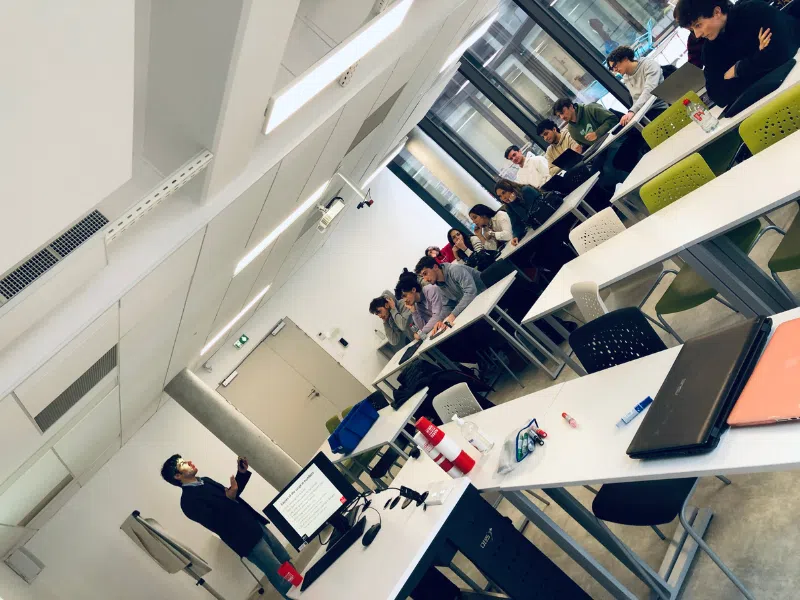Report
Until 1989 and the Beer Orders, there were only six major brewers in the UK and almost no micro-brewers. With the reduction in the cost of equipment and raw materials, and support from parliament, the right conditions were created for the growth of craft brewing, whose development followed the same upward trend until the end of 2019. With the sanitary restrictions due to Covid-19, accentuated by the Brexit, craft breweries had to reinvent themselves to sustain their businesses. What strategies have been adopted and how is the sector looking in the post-Covid-19 era? The seminar organised by Pr Gabriel Weber on the ESSCA Bordeaux campus aimed to answer this research question.

The intervention of Pr Ignazio Cabras highlighted the difficulties of breweries during and after the health crisis. Indeed, with the Covid-19-related closure of bars and pubs, business models were affected, moving from premium licences to direct sales. More recently, due to the inflation and cost of living crisis, people, struggling to live within their means can no longer put money into craft beers, and have turned to low cost. Brewers have seen public sector support diminish, and bar and brewery closures are more likely to be found in rural areas than in the other areas analysed. Despite all these constraints, if there is one good thing to remember, it is probably the strengthening of the relationship between the brewers and the local community.
After this presentation, the panel, both online and on-site, had the pleasure of learning about the history of KM5, a microbrewery located in Bordeaux. Its name has its roots in a small neighbourhood located in the middle of Patagonia on the coast of Argentina, Comodoro Rivadavia. Since its creation in 2016, this committed and responsible brewery has evolved well. It has been able to face the health crisis, in particular thanks to its online presence and its proximity to the community. Today, it offers 8 varieties of beer and has numerous partnerships across the country, such as with the city hall of Libourne and the Argentine embassy in Paris. Its next step is ecological transition with the implementation of solar panels, water recovery, and the use of renewable energy.
Its head brewer and one of its founders, Mr. Pablo Baez, explained that the quest is not for economic profit, but for the use of local products in a responsible manner, the transmission of know-how, exchanges with the community, and the fulfilment of a passion.
From the cultivation and harvesting of hops to their inclusion in fermentation, from the design of labels to their manufacture, from bottling to distribution, one came out of this seminar with all the guidance of a small brewer.
This event took place on Tuesday 6 December 2022 as part of the third-year elective ‘Business Sustainability and Climate Change’ at ESSCA Bordeaux.
ABSTRACTS
BREWING AT THE TIME OF COVID: THE UK CRAFT BEER SECTOR IN THE AFTERMATH OF THE PANDEMIC CRISIS
Professor Ignazio Cabras, Northumbria University/ESSCA School of Management
The number of craft breweries in the UK increased significantly in the last two decades, passing from 140 to 2,200 between 2000 and 2019 (SIBA, 2020). These businesses, progressively passed from serving a localised niche market of pubs and small wholesalers predominantly located within their spatial proximity, to supplying distributors and customers located in the UK and overseas. The SIBA report published in February 2020, while suggesting a slight reduction in beer production volumes, provided a positive outlook for the UK craft beer sector at least for the immediate future (SIBA, 2020). This prediction, however, occurred just before the Covid19 outbreak worldwide. In response to the pandemic, many governments worldwide imposed strict measures, such as movement lockdowns and business closures, to control infection rates. In the UK, the closure of pubs, bars, and restaurants shut down a key route to market for craft breweries, forcing them to reconfigure their business models, shifting a substantial proportion of sales to private custom mainly using online websites and marketplaces, and turning to local communities for support. New approaches to business emerged across breweries whose location varying from densely populated urban areas to most remote and less served rural and peripheral areas. Could these emerging approaches help brewers to survive the crisis and add to the resilience of future business models? The objective of this session is to investigate the impact of the pandemic crisis on UK craft breweries, assessing effects during and post-Covid19 periods. The analysis identifies a set of behavioural and responsive patterns across different areas from both business and locational perspectives, which provide original insights about aspects of resilience and vulnerability displayed by small and micro businesses operating in the brewing industry.
Ignazio Cabras is Professor of Regional Economic Development and Head of the Accounting and Financial Management Department at Newcastle Business School, Northumbria University. He is also Associate Fellow at the York Cross-disciplinary Centre for Systems Analysis (YCCSA), and Research Fellow at the EU*Asia Institute (ESSCA School of Management, France). His research interests are focused on economics and environment, with particular emphasis on regional growth and development, public sector management, employment issues, urban-rural dynamics, sustainability, community cohesion and social capital, industry and innovation, knowledge economies and ICT. Ignazio’s publication record includes more than 60 published works comprising journal articles, books and book chapters, and research reports. He peer-reviews articles for British and international scientific journals on regular basis, and seats in the Editorial Advisory Board of several academic journals.
BRASSERIE KM5: SETTING UP A MICROBREWERY IN THE BORDEAUX WINE REGION, FRANCE
Pablo Baez
Pablo Baez has set up Brasserie KM5 in the Port of Génissac in 2016. The Brasserie uses 100% artisanal products from French agriculture and without chemicals. Since 2018 they have grown their own hops and currently offers 8 varieties of beer. Brasserie KM5 is an interesting example of the craft beer boom in the wine country France. It has manoeuvred well the COVID-19 crises and stands for a degrowth-based sustainable and localised economy offering cultural events and puts well-being of the community ahead of profits.
Pablo Baez’s contribution will be in French.




